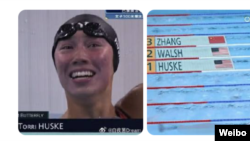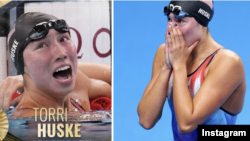Chinese social media users, incensed over allegations that Chinese Olympic swimmers have escaped punishment for using banned substances, are trying to turn the tables by promoting theories that American swimmers have been using banned drugs.
Evidence for the theory, which is spreading rapidly on the Chinese internet, is based principally on photos of the U.S. athletes showing unusually red faces after completing their events.
These suspicions come after Western media revealed in April that nearly two dozen Chinese swimmers tested positive for a banned substance ahead of the 2021 Tokyo Olympics. Many of them were eventually allowed to compete in the event.
In photos circulated by nationalist commentators and bloggers on the microblogging platform Weibo this week, American medalists Kate Douglass, Regan Smith and Torri Huske are seen gazing up at the scoreboard after their races while still floating in the pool, their faces looking pinkish red.
The redness, many social media users claim, is a sign of drug use.
"The two American athletes’ faces looked very odd," wrote a blogger in a post that has received thousands of likes, referring to Huske and her teammate Gretchen Walsh, who won gold and silver respectively in the women’s 100-meter butterfly final.
"They are so red that they look almost purple," the post wrote. "Did the gold and silver medalists take drugs? They should get tested."
Huske, who has won one gold and two silvers so far in Paris, has become the biggest target of doping accusations. Her photos have been widely shared on Chinese social media.
Lin Bo, who is a Chinese medicine physician according to his Weibo bio, claimed that the redness on Huske’s face is a "typical reaction to drugs."
However, personal photos of the 21-year-old Virginian on her Instagram account show that the red tint has always been there.
Medical experts say red or pinkish skin is quite common for some people because exercise can cause the cells in the skin to release histamine, which causes the blood vessels to widen, adding to the exercise-induced flushing — especially with intense exertion, such as swimming.
Some red face photos used by netizens to cast doubt on the integrity of U.S. athletes are of French swimmer Anastasiia Kirpichnikova.
U.S. gymnast Simone Biles, who has won two golds in Paris, has also been attacked on the Chinese internet.
In a popular post on Weibo, a commentator questions whether Biles’ medications for Attention Deficit/Hyperactivity Disorder, which she has been granted an exemption to take, have given her an unfair advantage in competitions.
VOA has reached out to the International Olympics Committee, the United States Olympic & Paralympic Committee and the World Anti-Doping Agency for comments but has not yet received a reply from the latter two organizations.
In a reply, the International Olympics Committee wrote that "anti-doping matters have been made independent from the IOC."
China faces doping scandal
The unfounded online allegations against the American athletes come at a time when Beijing is trying to fend off a massive doping scandal involving some of China’s best swimmers.
In April, The New York Times and German broadcaster ARD reported that 23 Chinese swimmers tested positive for a banned heart medication at a 2021 sporting event. After an investigation conducted by the China Anti-Doping Agency or CHINADA, the World Anti-Doping Agency, or WADA, accepted its conclusion that the testing results were caused by accidental contamination.
WADA confirmed the reporting. In a public statement, it said that it stands by its decision not to punish the athletes, as the concentrations of TMZ, a performance-enhancing substance, detected in the samples were so low that it wouldn’t have had any effect on performance.
Some of the involved swimmers went on to compete in the Tokyo Olympics that year, including Zhang Yufei and Wang Shun, who together won three gold medals for China.
On July 30, The New York Times reported another doping incident that had led to no punishment for involved Chinese athletes. Two swimmers tested positive in 2022 for a banned drug. Chinese authorities, after looking into the matter, said that it was another case of sample contamination and that the swimmers had eaten hamburgers that contained the substance by accident.
WADA accepted Beijing’s conclusion and, in a statement, blamed the U.S. media for the "politicization of anti-doping" issues.
CHINADA, in a statement, called out The New York Times for "disrupting the order of the swimming competitions of the Paris Olympics, disturbing the Chinese athletes and ultimately undermining their performance at the Paris games."
Beijing hasn’t responded to the July 30 report. But in April, Wang Wenbin, then spokesperson for China’s Foreign Ministry, responded to The New York Times’ and ARD’s earlier reporting by calling it "false information."
Some say West made up scandals
In China, where access to Western media is limited and social media is often filled with anti-U.S. narratives, many say the doping scandals were manufactured by the West to undermine China’s image in sports.
Wang Guan, a host for China’s state media China Global Television Network, wrote in a social media post that the "Western sports sphere" is collectively "hyping up the so-called doping incidents of Chinese swimmers at the Paris Olympics" to "kill our reputation."
Zhang, one of the swimmers involved in the 2021 doping incident, spoke up about what she perceives as unfairness toward Chinese athletes in Paris.
"Why are Chinese athletes questioned when they swim fast, but nobody dared to doubt Michael Phelps when he won eight gold medals?" she asks, referring to the former American swimmer’s performance in the 2008 Beijing Olympics.
Some nationalist commentators called on the International Olympics Committee, or IOC, to further scrutinize American athletes.
Shen Yi, an international relations professor at Fudan University in Shanghai, said in a new video column that the United States is in decline, which is why it wants to suppress China’s rise. He said that the IOC should state publicly whether each American athlete who won medals has been allowed to use certain health-related medications.
"[Let’s see] how many of them are from the ‘Purple Skin Corps,’" he said, alluding to the allegation that U.S. swimmers’ red faces indicate doping.

